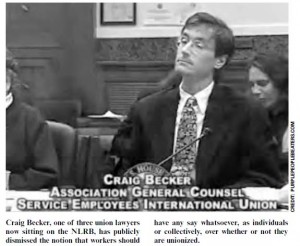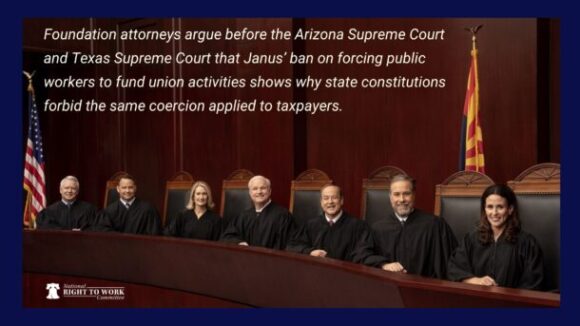DC-Area Transdev Driver Takes Case Regarding Union-Instigated Assault to Federal Appeals Court
Biden Labor Board claims ATU union did not violate law even after Transdev worker experienced slap and termination attempt from union officials
 From an extensive Al Jazeera America article about the National Right to Work’s Unite Here Local 355 v. Martin Mulhall and Mardi Gras Gaming ( a case that could end card-check forced unionism as we know it):
From an extensive Al Jazeera America article about the National Right to Work’s Unite Here Local 355 v. Martin Mulhall and Mardi Gras Gaming ( a case that could end card-check forced unionism as we know it):
Mulhall, said AFL-CIO attorney Becker, “represents what is a longstanding effort on the part of the Right to Work Foundation to basically turn labor law upside down.” Labor law over the past 85 years, he said, has assumed “a process of bargaining between unions and employers that involve mutual accommodations.”
“Card check and neutrality have been called by different names, but even before the (National Labor Relations Act) was passed in 1935, you had voluntary recognition,” Becker said. “You had workers walk into the boss’s office saying, ‘We want a union.’”
more
Federal criminal law prohibits employers and unions from trading money or other “things of value.” According to Mulhall and Mardi Gras, neutrality agreements flout this interdiction and improperly circumvent the secret-ballot election set out in the National Labor Relations Act. According to Local 355, the law forbids bribery and corruption, not mutually beneficial agreements between cooperating employers and unions.
A powerful, conservative non-profit group opposed to organized labor helped shape Mardi Gras’ strategy. The National Right to Work Legal Defense Foundation (NRTW) — whose stated mission is to “eliminate coercive union power and compulsory unionism” — came to represent Martin Mulhall, a Mardi Gras employee opposed to the union.
Mulhall sued Local 355 and Mardi Gras, but the case was thrown out by a Florida District Court. On appeal by Mulhall, the U.S. Court of Appeals for the Eleventh Circuit sent the case back down. In the Eleventh Circuit’s view, the kinds of promises and information exchanged in neutrality agreements were “a thing of value,” and therefore as corruption-prone as cash bribes. Unite Here then appealed to the Supreme Court.
more
The NRTW has long opposed neutrality agreements and card check, which often come together. In past union campaigns, so-called “card check neutrality” has led to unionization at a higher rate than union elections. Labor organizers see this as proof that, in the absence of employers’ anti-union campaigns, workers vote yes. The NRTW sees these same results as evidence of improper coercion and union mischief.
Patrick Semmens, Vice President of the NRTW, said that many workers are “victims of card check instant organizing and neutrality agreements.” Unions’ increased reliance on these mechanisms, he wrote in an email, is part of a top-down strategy that violates workers’ rights.
“Instead of relying on the traditional shop-floor organizing methods, union officials are increasingly cutting backroom deals with company management that allows both sides to sell out the workers.”

Biden Labor Board claims ATU union did not violate law even after Transdev worker experienced slap and termination attempt from union officials
NY Starbucks workers are challenging NLRB that refuses to let them hold decertification votes to remove unwanted SBWU union

Foundation attorneys argue before the Arizona Supreme Court and Texas Supreme Court that Janus’ ban on forcing public workers to fund union activities shows why state constitutions forbid the same coercion applied to taxpayers.